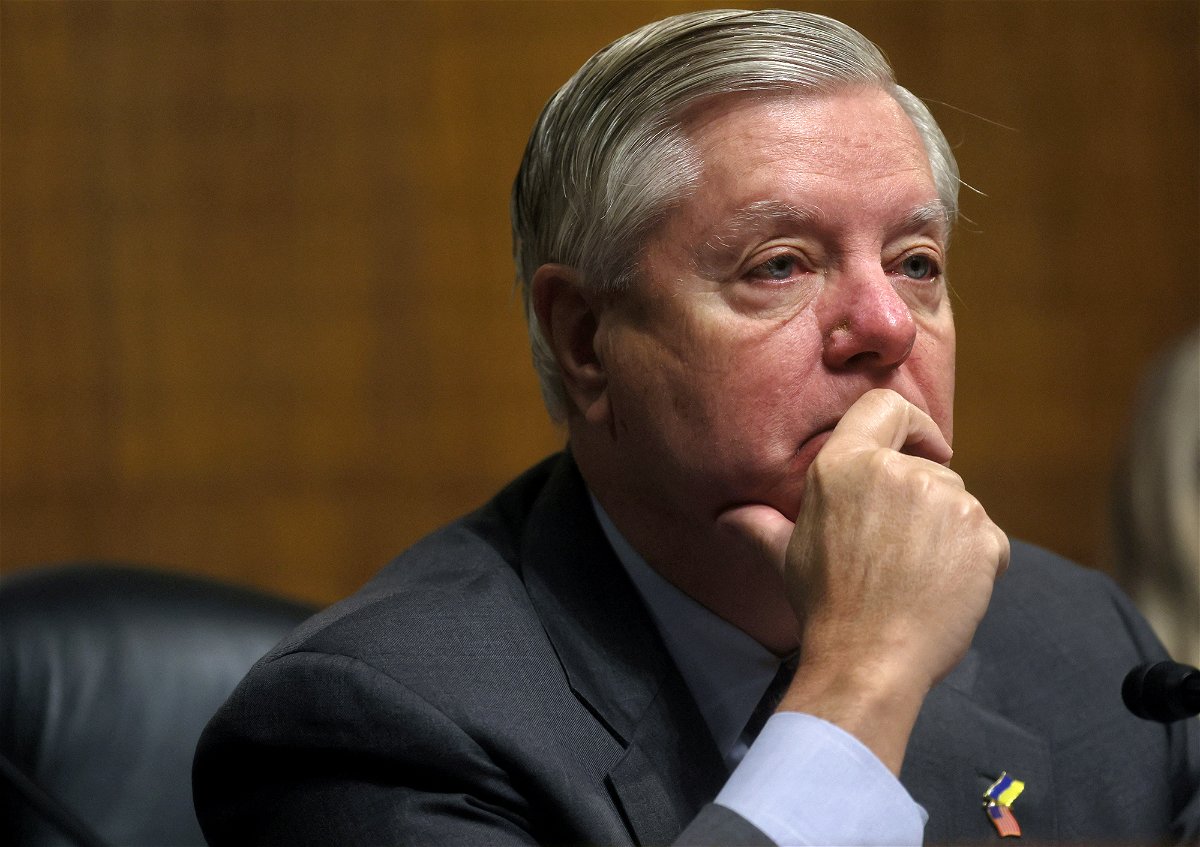Some Republicans call for more transparency around Supreme Court while calling Democratic push for ethics reform partisan

Senator Lindsey Graham (R-SC) is seen here on Capitol Hill on January 25. Some Republican lawmakers said on May 2 that they want to see more transparency around the Supreme Court.
By Tierney Sneed, CNN
Some Republican lawmakers said Tuesday that they want to see more transparency around the Supreme Court, though they railed against the Democratic push for Congress to impose a code of conduct on the justices who exempt themselves from many of the ethics rules that lower courts follow.
The debate — coming after several weeks of reports of alleged ethical lapses by the justices that have dominated headlines — was the subject of a hearing in the Senate Judiciary Committee, where a law professor, legal advocates and two former judges, including former Attorney General Michael Mukasey, testified on whether Supreme Court ethics reform was warranted.
Sen. Lindsey Graham, the top Republican on the committee, said Democrats were leading an “unseemly effort” to “destroy the legitimacy” of the court under conservative Chief Justice John Roberts, who declined an invitation to testify.
He argued Congress should be focused on boosting security around the justices, as he accused Democrats of exacerbating the threats and hostility they face.
But the South Carolina senator conceded that he has “expressed a desire for the court to be more transparent” and “to have rules that the public can relate to,” even as he has insisted it should be left to the court to decide how to regulate itself.
Sen. Chuck Grassley, an Iowa Republican who previously led the committee, said that “judges are expected to comply with high standards and integrity, and it does appear that there needs to be better oversight.”
He accused Democrats, however, “and their left-wing dark money interests groups, as well their allies in the liberal media” of engaging in “a crusade to threaten pack and smear the courts.”
Democrats, meanwhile, continued to beat the drum around what they described as the failure of the Supreme Court to act on its own to correct its ethical course.
Senate Judiciary Committee Chair Dick Durbin said that recent assurances from the Supreme Court in response to the committee’s ethics-related inquiries were a “defense of the status quo” and that the justices “were oblivious to the obvious.”
“The highest court of the land should not have the lower ethical standards,” the Illinois Democrat said.
Durbin was referencing a statement Roberts released last week when he turned to Durbin’s request that he appear before the Senate.
The statement, titled a “Statement on Ethics and Principles,” and signed onto by all nine justices, said the court was seeking to bring “new clarity” to how it approaches ethics issues. It said that the Supreme Court has “voluntarily” opted to follow the “substance” of the regulations for lower courts set out by the Judicial Conference, the judicial branch’s internal policy making body, including financial disclosure mandates and its limits on gifts.
University of Virginia School of Law professor Amanda Frost, a court ethics expert called to testify by the committee’s majority, raised concerns Tuesday that last week’s and other statements from the Supreme Court implied that the justices don’t see themselves bound by the laws that Congress has already passed.
“I find that very confusing in light of the text, structure and long history of congressional administration of the courts,” she said.
A debate over separation of powers and whether Congress can step in
Much of the hearing revolved around the question of whether Congress has the power to step in and impose a code of conduct on the justices, if the court refuses to adopt one on its own. Currently, the justices decide for themselves whether a potential conflict requires their recusal from a case and the process for guaranteeing that justices are following the financial disclosure rules is very opaque. Roberts told Durbin in a letter Monday the justices consult a “wide variety of guidance” when considering those kinds of ethical questions.
Some of the court reform proposals being offered would require the Supreme Court to adopt enforcement mechanisms similar to what lower courts are subjected to, or would create an independent entity to advise justices on ethics issues and conduct ethics investigations.
The GOP witnesses at Tuesday’s hearing argued that such bills, if passed by Congress, would run afoul of how the Constitution has set up the US system of government.
“These proposals for an ethics investigations counsel or a designated ethics officer would damage and debase the institution by encouraging frivolous and politically-motivated attacks on the court’s integrity,” said Thomas Dupree, the co-chair of the Appellate and Constitutional Law Practice Group at the law firm Gibson, Dunn & Crutcher. He testified that any code of conduct imposed on the court by Congress would be an “extraordinary mandate that infringes on the separation of powers.”
Republican Sen. Thom Tillis agreed with the concerns Dupree raised about the congressional proposals to impose new ethical obligations on the high court and said he hoped Tuesday’s hearing functioned more as an “oversight proceeding,” rather than laying the groundwork for new legislation.
“I do hope that this process has been instructive to an Article Three branch,” Tillis, of North Carolina, said, adding he thought the court “could update, refresh and address the concerns without requiring any congressional action and if they act in the near term, maybe this committee could be instructive.”
To counter the claims that Congress cannot play a role in dictating the high court’s ethics rules, Democrats were also able to point to written testimony from former conservative federal judge J. Michael Luttig and Laurence Tribe, a Supreme Court litigator and Harvard professor on the left. Both legal experts backed the idea that Congress has the power to write a code of conduct for the justices, though Luttig stopped short of asserting that such a move is currently justified, arguing instead that the Supreme Court should subject “itself to the highest professional and ethical standards.”
Luttig’s sentiment was picked up by former federal judge Jeremy Fogel, a majority witness who served on the Judicial Conference’s committee tasked with carrying out the financial disclosure regulations for the judiciary.
“The reason I came here today, really, is I hope that the court will adopt a formal code of conduct,” Fogel said.
Mukasey, the other former judge testifying, denied that the Supreme Court needed to take any additional steps towards transparency. Mukasey also suggested he did not see an issue with a judge receiving lavish gifts and travel from a friend, as he was grilled by Sen. Jon Ossoff, a Democrat from Georgia, about whether he would have accepted hundreds of thousands of dollars of travel from a politically active party.
“If I were a district judge, and somebody wanted to fly me on his private plane, on a vacation with his family, if I were friendly with that person? Would I have refused? And endanger the friendship? I’m not sure that I would have,” Mukasey said.
The-CNN-Wire
™ & © 2023 Cable News Network, Inc., a Warner Bros. Discovery Company. All rights reserved.


